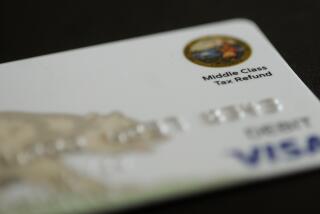What really happens to your FICO score when you cancel a credit card?

You may want to consider a few things before you cancel your credit card.
- Share via
Los Angeles-based entrepreneur William Swann had a soft spot for his Citi Gold AAdvantage World MasterCard.
“It was my second-oldest credit card,” he said. “I got it right out of college, and every dollar I spent was a mile earned on American.”
He did not, however, have tender feelings about the card’s $50 annual fee.
As his income and credit score improved and his travel shifted to other airlines, Swann said he no longer maximized the card’s perks.
But he kept the card because, like many cardholders, he thought canceling would hurt his credit score.
Which raises this concern: What really happens to your credit score?
Share your best summer vacation photos with the L.A. Times Travel section
Swann’s hesitation was justified … to a point. “You can expect your credit score to drop when you cancel a credit card, but how much depends on a variety of factors,” David Rae, a certified financial planner with Trilogy Financial in Torrance, said in an email.
Your credit score is based on five major factors, according to the Fair Isaac Corp. (FICO), the index that credit bureaus use to rate consumers: payment history, how much you owe on loans and credit cards, length of credit history, types of accounts and recent credit activity.
Rae focused on credit history, plus length of credit history versus how much credit you are using. Although length of credit history accounts for 15% of your score, the debt-to-credit utilization ratio is weighted twice as much.
Because of that, Rae said, “If you don’t carry balances and aren’t planning a major purchase like a car or house in the next few months, there really isn’t anything to worry about when canceling a credit card.” Your score may drop, but it will be negligible in the long run.
Beyond the potential effect on one’s credit score, Gary Leff, founder of the travel and credit-card blog View From the Wing, outlined other factors to consider when deciding whether to keep a credit card with an annual fee.
“The annual fee for a card always matters because you have a value proposition that includes rewards for your spending versus the cost of those rewards (i.e., the annual fee),” he said, “and how the card compares to other available products.”
Swann, for instance, could have reaped $50 worth of value from his card (equivalent to its annual fee) by using its benefit of a free checked bag on American just twice a year. Both the Citi Hilton HHonors Reserve ($95) and Chase Hyatt ($75) credit cards offer cardholders a free hotel night each year on their account anniversary that can be worth more than the card’s annual fee, depending on where the award is redeemed.
Before you cancel, consider whether you can negotiate with the issuer.
“If you don’t want to keep a card because of its fee,” Leff said, “issuers might give you an incentive not to cancel, such as bonus points or waiving the fee altogether, since it’s cheaper for the card company to retain you than acquire a new customer.”
But also consider looking for cards with no fees: “There are better no-fee cards now too, such as the new EveryDay from American Express,” Leff said, “which offers bonuses for spending, and earns points that are fully transferable to a variety of miles programs.”
Leff’s top three picks of credit cards well worth the annual fees:
— The Chase Sapphire Preferred ($95 annual fee) “earns double points on travel and dining, and points transfer to a variety of airline and hotel programs.”
— The Amex EveryDay Preferred ($95, a variation on the card above) because, “when you use the card for 30 purchases or more in a month, you earn a 50% bonus on all points earned that month, and those points transfer to a variety of airline and hotel programs.”
— The Starwood American Express ($95) “has the most airline transfer partners,” he said. “Plus, when you transfer 20,000 points at a time to most of them, you get 5,000 bonus miles. That’s like earning 1.25 miles per dollar on all your spending. And of course, you can use them for hotel stays too.”
More to Read
Sign up for The Wild
We’ll help you find the best places to hike, bike and run, as well as the perfect silent spots for meditation and yoga.
You may occasionally receive promotional content from the Los Angeles Times.






